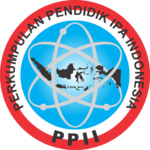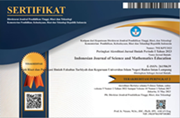An analysis of students' concept application in problem-solving of electrical circuits through inquiry-based learning
Abstract
Keywords
Full Text:
PDFReferences
J. L. Docktor, N. E. Strand, J. P. Mestre, and B. H. Ross, “Conceptual problem solving in high school physics,” Phys. Rev. Spec. Top. - Phys. Educ. Res., vol. 11, no. 2, pp. 1–13, 2015, doi: 10.1103/PhysRevSTPER.11.020106.
L. M. Goodhew, A. D. Robertson, P. R. L. Heron, and R. E. Scherr, “Student conceptual resources for understanding mechanical wave propagation,” Phys. Rev. Phys. Educ. Res., vol. 15, no. 2, pp. 1-16, 2019, doi: 10.1103/PhysRevPhysEducRes.15.020127.
M. G. Nugraha, I. Kaniawati, D. Rusdiana, and K. H. Kirana, “Combination of inquiry learning model and computer simulation to improve mastery concept and the correlation with Critical Thinking Skills (CTS),” AIP Conf. Proc., vol. 1708, no. 2016, pp. 1-6, doi: 10.1063/1.4941181.
N. Nehru, W. Kurniawan, and C. Riantoni, “Exploration of students’ problem-solving skills in physics-based on expert and novice categories,” in The Mathematics, Science, and Computer Science Education International Seminar (MSCEIS), vol. 1, no. 4, 2019, pp. 1-8, doi: 10.4108/eai.12-10-2019.2296469.
sutopo, “Students’ Understanding of fundamental concepts of mechanical wave,” J. Pendidik. Fis. Indones., vol. 12, no. 1, pp. 41–53, 2016, doi: 10.15294/jpfi.v12i1.3804.
V. Mešić et al., “Measuring students’ conceptual understanding of wave optics: A Rasch modeling approach,” Phys. Rev. Phys. Educ. Res., vol. 15, no. 1, pp. 1–20, 2019, doi: 10.1103/PhysRevPhysEducRes.15.010115.
J. L. Docktor and J. P. Mestre, “Synthesis of discipline-based education research in physics,” Phys. Rev. Spec. Top. - Phys. Educ. Res., vol. 10, no. 2, pp. 1–58, 2014, doi: 10.1103/PhysRevSTPER.10.020119.
L. Yuliati, C. Riantoni, and N. Mufti, “Problem solving skills on direct current electricity through inquiry-based learning with Phet simulations,” Int. J. Instr., vol. 11, no. 4, pp. 123–138, 2018, doi: 10.12973/iji.2018.1149a.
E. Campos, E. Hernandez, P. Barniol, and G. Zavala, “Phenomenographic analysis and comparison of students’ conceptual understanding of electric and magnetic fields and the principle of superposition,” Phys. Rev. Phys. Educ. Res., vol. 17, no. 2, pp. 1-17, 2021, doi: 10.1103/PhysRevPhysEducRes.17.020117.
D. C. Aktan, “Investigation of students’ intermediate conceptual understanding levels: The case of direct current electricity concepts,” Eur. J. Phys., vol. 34, no. 1, pp. 33–43, 2013, doi: 10.1088/0143-0807/34/1/33.
P. Vreeland, “Analyzing simple circuits,” Phys. Teach., vol. 40, no. 2, pp. 99–100, 2002, doi: 10.1119/1.1457314.
Z. C. Zacharia and T. de Jong, “The effects on students’ conceptual understanding of electric circuits of introducing virtual manipulatives within a physical manipulatives-oriented curriculum,” Cogn. Instr., vol. 32, no. 2, pp. 101–158, 2014, doi: 10.1080/07370008.2014.887083.
Z. J. Kock, R. Taconis, S. Bolhuis, and K. Gravemeijer, “Creating a culture of inquiry in the classroom while fostering an understanding of theoretical concepts in direct current electric circuits: A balanced approach,” Int. J. Sci. Math. Educ., vol. 13, no. 1, pp. 45–69, 2014, doi: 10.1007/s10763-014-9535-z.
D. P. Smith and P. van Kampen, “Teaching electric circuits with multiple batteries: A qualitative approach,” Phys. Rev. Spec. Top. - Phys. Educ. Res., vol. 7, no. 2, p. 020115, Nov. 2011, doi: 10.1103/PhysRevSTPER.7.020115.
C. Singh and A. Mason, “Physics graduate students’ attitudes and approaches to problem solving,” in AIP Conference Proceedings, 2009, vol. 1179, no. 2009, pp. 273–276. doi: 10.1063/1.3266734.
T. Minich, “Conceptualizing series and parallel circuits through 3-D modeling,” Phys. Teach., vol. 43, no. 7, pp. 448–451, 2005, doi: 10.1119/1.2060644.
W. H. Baird, C. Richards, and P. Godbole, “Advanced imaging of elementary circuits,” Phys. Teach., vol. 50, no. 9, pp. 561–562, 2012, doi: 10.1119/1.4767496.
R. G. Gunawan, F. Festiyed, Y. Yerimadesi, I. Ilwandri, and R. G. Gunawan, “The problem-based learning model integrated with the integrated learning model in science learning: A systematic literature review,” Indones. J. Sci. Math. Educ., vol. 6, no. 2, pp. 227–237, Jul. 2023, doi: 10.24042/ijsme.v6i2.17576.
P. Hsu and L. Venegas, “Activity features of high school students ’ science learning in an open-inquiry-based internship programme,” Int. J. Sci. Educ., vol. 1, no. 1, pp. 1–19, 2018, doi: 10.1080/09500693.2018.1479801.
Kadir, Lucyana, and G. Satriawati, “The implementation of open-inquiry approach to improve students’ learning activities, responses, and mathematical creative thinking skills,” J. Math. Educ., vol. 8, no. 1, pp. 103–114, 2017, doi: 10.22342/jme.8.1.3406.103-114.
S. A. Sotiriou and F. X. Bogner, “Education sciences how creativity in STEAM modules intervenes with self-efficacy and motivation,” Educ. Sci., vol. 2, no. 1, pp. 2–15, 2020.
E. . Carl J.Wenning, “Experimental inquiry in introductory physics courses,” J. Phys. Teach. Educ. online, vol. 6, no. 2, pp. 1–20, 2011.
I. Bilgin, “The effects of guided inquiry instruction incorporating a cooperative learning approach on university students’ achievement of acid and bases concepts and attitude toward guided inquiry instruction,” Sci. Res. Essays, vol. 4, no. 10, pp. 1038–1046, 2009.
G. Gunawan, A. Harjono, M. Nisyah, M. Kusdiastuti, and L. Herayanti, “Improving students’ problem-solving skills using inquiry learning model combined with advance organizer,” Int. J. Instr., vol. 13, no. 4, pp. 427–442, 2020, doi: 10.29333/iji.2020.13427a.
I. Rahmat and S. Chanunan, “Open inquiry in facilitating metacognitive skills on high school biology learning: An inquiry on low and high academic ability,” Int. J. Instr., vol. 11, no. 4, pp. 593–606, 2018.
M. Ubaidillah, Hartono, P. Marwoto, Wiyanto, and B. Subali, How to improve critical thinking in physics learning? A systematic literature review, vol. 2023, no. 28, pp. 161-187, 2023. doi: 10.7358/ecps-2023-028-ubai.
C. Riantoni, L. Yuliati, N. Mufti, and N. Nehru, “Problem solving approach in electrical energy and power on students as physics teacher candidates,” J. Pendidik. IPA Indones., vol. 6, no. 1, pp. 55–62, 2017, doi: 10.15294/jpii.v6i1.8293.
H. C. Sabo, L. M. Goodhew, and A. D. Robertson, “University student conceptual resources for understanding energy,” Phys. Rev. Phys. Educ. Res., vol. 12, no. 1, pp. 1-28, 2016, doi: 10.1103/PhysRevPhysEducRes.12.010126.
J. Robertson, “The three Rs of action research methodology: Reciprocity, reflexivity, and reflection-on-reality,” Educ. Action Res., vol. 8, no. 2, pp. 307–326, 2000, doi: 10.1080/09650790000200124.
I. Rahmawati, S. Sutopo, and S. Zulaikah, “Analysis of students’ difficulties about rotational dynamics based on resource theory,” J. Pendidik. IPA Indones., vol. 6, no. 1, pp. 95–102, 2017, doi: 10.15294/jpii.v6i1.9514.
Nehru, C. Riantoni, D. P. Rasmi, W. Kurniawan, and Iskandar, “‘Knowledge in pieces’ view: Conceptual understanding analysis of pre-service physics teachers on direct current resistive electrical circuits,” J. Educ. Gift. Young Sci., vol. 8, no. 2, pp. 723–730, 2020, doi: 10.17478/jegys.695853.
Cresswell & Clark, Designing and conducting mix methods research. United State America: SAGE Publication, 2017.
P. V. Engelhardt and R. J. Beichner, “Students’ understanding of direct current resistive electrical circuits,” Am. J. Phys., vol. 72, no. 1, pp. 98–115, 2004, doi: 10.1119/1.1614813.
T. L. Contant, J. E. Bass, A. A. Tweed, and A. A. Carin, Teaching science through inquiry-based instruction, 13th ed. Hudson Street: Pearson, 2018.
M. Vlassi and A. Karaliota, “The comparison between guided inquiry and traditional teaching method: A case study for the teaching of the structure of matter to 8th grade greek students,” Procedia - Soc. Behav. Sci., vol. 93, no. 1, pp. 494–497, 2013, doi: 10.1016/j.sbspro.2013.09.226.
I. Adler, M. Zion, and E. Rimerman-Shmueli, “Fostering teachers’ reflections on the dynamic characteristics of open inquiry through metacognitive prompts,” J. Sci. Teacher Educ., vol. 30, no. 7, pp. 763–787, 2019, doi: 10.1080/1046560X.2019.1627060.
C. M. B. Tecson, M. A. Salic-Hairulla, and H. J. B. Soleria, “Design of a 7E model inquiry-based STEM (ISTEM) lesson on digestive system for grade 8: An open-inquiry approach,” in Journal of Physics: Conference Series, vol. 1835, no. 1, 2021, pp. 1-8, doi: 10.1088/1742-6596/1835/1/012034.
Z. C. Zacharia and C. P. Constantinou, “Comparing the influence of physical and virtual manipulatives in the context of the physics by inquiry curriculum: The case of undergraduate students’ conceptual understanding of heat and temperature,” Am. J. Phys., vol. 76, no. 4, pp. 425–430, 2008, doi: 10.1119/1.2885059.
M. R. Stetzer, P. van Kampen, P. S. Shaffer, and L. C. McDermott, “New insights into student understanding of complete circuits and the conservation of current,” Am. J. Phys., vol. 81, no. 2, pp. 134–143, 2013, doi: 10.1119/1.4773293.
J. J. Clement, “Students preconceptions in introductory mechanics,” Am. J. Phys., vol. 50, no. 1, pp. 10–66, 1982.
A. Elby and D. Hammer, “Epistemological resources and framing: A cognitive framework for helping teachers interpret and respond to their students’ epistemologies,” Pers. Epistemol. Classr. Theory, Res. Implic. Pract., vol. 1, no. 3, pp. 409–434, 2010, doi: 10.1017/CBO9780511691904.013.
M. M. Yunus, A. F. Amin, and R. A. Sari, “Analyzing students’ understanding of electric circuits: The role of inquiry-based learning,” Eur. J. Phys. Educ., vol. 11, no. 3, pp. 30–40, 2020.
A. F. Amin, M. M. Yunus, and R. A. Sari, “Understanding the relationship between current, voltage, and resistance in electric circuits: A study on students’ misconceptions,” Int. J. Sci. Math. Educ., vol. 17, no. 2, pp. 221–240, 2019.
A. Setiawan, H. Susanto, and A. Prabowo, “The importance of understanding the concept of power in electrical circuits: Implications for teaching physics,” J. Phys. Educ., vol. 5, no. 1, pp. 1–10, 2017.
A. Mason and C. Singh, “Using categorization of problems as an instructional tool to help introductory students learn physics,” Phys. Educ., vol. 51, no. 2, pp. 1-5, 2016, doi: 10.1088/0031-9120/51/2/025009.
A. Kadir and S. Nurhayati, “The effectiveness of inquiry-based learning to enhance critical thinking skills and learning outcomes of senior high school students,” J. Educ. Res., vol. 34, no. 2, pp. 123–136, 2019.
D. Firmansyah, A. Wahyuni, and I. Setiawan, “Exploring the challenges of inquiry-based learning in science education: A case study in indonesian secondary schools,” Int. J. Sci. Educ., vol. 43, no. 8, pp. 1153–1170, 2021.
M. Susanto and F. Wulandari, “Metacognitive skills and inquiry-based learning: Their role in enhancing problem-solving abilities in physics education,” J. Educ. Psychol. Sci., vol. 12, no. 4, pp. 276–289, 2020.
DOI: http://dx.doi.org/10.24042/ijsme.v7i3.22874
Refbacks
- There are currently no refbacks.
Copyright (c) 2024 Unit Riset dan Publikasi Ilmiah FTK UIN Raden Intan Lampung

This work is licensed under a Creative Commons Attribution-ShareAlike 4.0 International License.

Indonesian Journal of Science and Mathematics Education is licensed under a Creative Commons Attribution-ShareAlike 4.0 International License.




